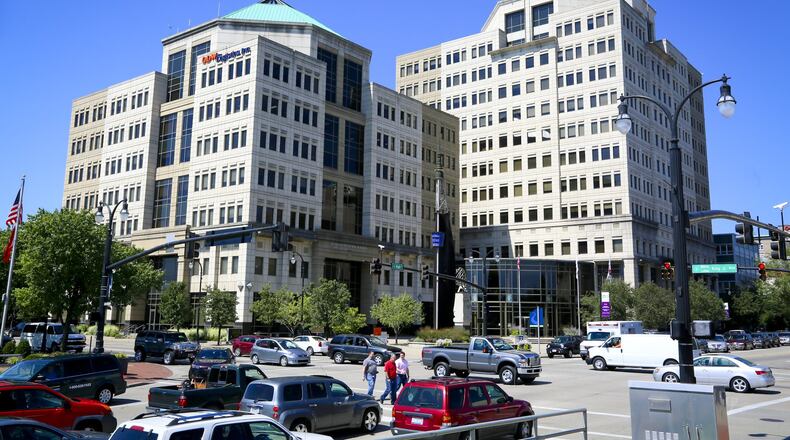Senate President Keith Faber, (R-Celina) explained why in a YouTube interview.
“The goal is to make sure you provide adequate compensation,” Faber said. “I’d be the first one to say that may be judges, prosecutors and sheriffs who probably need raises. You’ve got sheriffs who make less than their deputies; that’s probably not a good long-term management strategy.”
Sheriff Richard Jones stands to get the biggest pay hike locally. His new salary will be $115,098 in 2019, more than $30,000 higher than now.
County judges are allowed to receive pay hikes mid-term and actually received their first increases in September 2015. They will get five-percent pay bumps each in 2017, 2018 and 2019. The common pleas judges salaries top out at $147,600 in 2019, a $20,150 increase with the state paying the lion’s share. The county is responsible for $14,000 per judge of that amount.
“We incur none of the raise; the raise comes out of the state’s budget,” Court Administrator Wayne Gilkison said. “So for us it’s status quo, it doesn’t affect the court’s budget at all.”
Common Pleas Presiding Judge Noah Powers said he never likes to “look a gift horse in the mouth,” but he believes the extra pay was essential in order to attract and retain good lawyers for the judicial system.
“It had been a long time since anybody received a raise,” he said. “I think the legislators looked at the fact that attorneys in private practice were making, quite frankly, a lot more than the judges were, and I think they sought to address that inequity.”
The bill that authorized the raises also gave two additional years of raises to prosecutors and sheriffs.
Prosecutor Mike Gmoser was making $115,703 last year, and by 2019 his pay will jump $24,935 to $140,638. Gmoser said he has never been in the prosecution business for the money, since he had a successful private practice before taking office. But he said he believes his assistant prosecutors are underpaid.
“I think I and my staff are worth every penny that the taxpayers pay us,” he said. “They get a lot of bang for their buck, and they’ll continue to get that bang for their buck every year that I’m here. That’s not a political advertisement, it’s just the way I feel about this job.”
The legislature approved pay raises for other elected offices — like county commissioners — of five percent in 2016 and 2017. However, since they cannot get mid-term pay raises, they’ll get a 10-percent hike next year.
Commissioner Cindy Carpenter and Auditor Roger Reynolds, who were re-elected in 2014, won’t be eligible for their increase until 2019. Carpenter’s salary will move $7,890 to $84,866 in two years and her colleagues, commissioners Don Dixon and T.C. Rogers, will receive the same hike next year.
Reynolds will realize a $4,521 raise, bringing him up to $94,935. Auditors also receive a stipend of the undivided estate tax funds, so he will receive up to $3,000 more. He said he knew what he was getting into when he chose public service and, while his pay might be lower than the private sector, the benefits are excellent.
“I think I’m paid fairly,” he said. “I can see how it would be a challenge for public officials to not have a raise for 11 years,” he said. “But it’s our choice if we want to continue in this profession, we know what the pay is. The great part is, like most government jobs, the benefits are nice.”
Because of tax billings, county treasurers don’t receive their raises at the beginning of the year like others. Treasurer Nancy Nix won’t see her $6,996 raise until September of next year when she’ll be earning $75,273.
“I’m a certified public accountant with a master’s in business administration, and feel the salary I’ll receive in September 2017 is more commensurate with my qualifications and experience. I don’t think any of us elected officials go into public service for the money, yet we have bills to pay like everyone else,” she said. “After nine years with no raise, while health insurance and other expenses keep rising significantly, I’m very appreciative to be granted a raise next year. It’s important for the legislature to set salaries at a level somewhat competitive with the private market, especially in areas where true professionals are needed such as attorneys, law enforcement officers and accountants.”
Faber has introduced a resolution that, if it passes the House, will go to the voters and establish a Pay Commission to take politics out of public sector pay decisions.
“Isn’t it time we take politicians out of setting their own pay?” Faber said. “Isn’t it time that we put the citizens into setting the compensation of elected officials? I think it’s a far better process, it’s far better than having legislators do it… this will make it fairer, more consistent and frankly give it the ability to go up or down as well.”
About the Author
